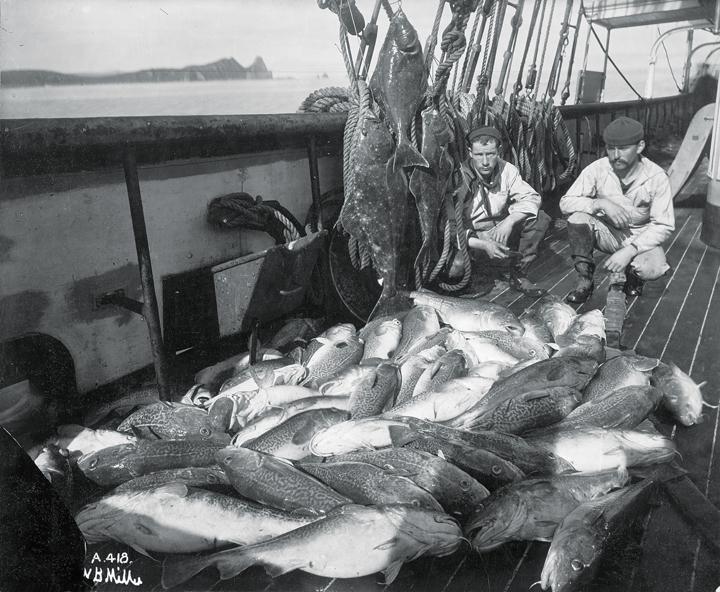Bohl: Be a man, our culture will value you less
Courtesy photo: Library of Congress
Halibut and cod fishing in Alaska pre-1927. Courtesy photo: Library of Congress
March 3, 2011
As of late there has been a lot of hubbub about gender roles. I can hardly seem to escape the noise about them. Talk of the role of women in society is everywhere. At Iowa State we have a women’s studies program that “focuses on the study of issues and scholarship relevant to women and gender, challenges existing systems of knowledge and forges new scholarship based on the centrality of gender as a category of analysis,” and “seeks to improve critical thinking and to question prevailing assumptions.”
Since we lack any men’s study courses, and apparently as a university care little for issues and scholarship relevant to men and gender, I’d like to beg a critical question of such a nature, an answer for which may hopefully be found using gender as a category of analysis. The question I beg is, “If men and women are equal under the law, why is a woman’s life worth more than mine in our modern, equal society?” If you find fault with my words, consider the following: How often have you heard the phrase “… even women and children were killed”? Strange, is it not, that we cringe so at the thought of the deaths of women and children, but are conditioned to accept the violent deaths of men?
In 1912 – an era in which the feminist movement was but beginning –when the RMS Titanic was slipping beneath icy waves, her passengers became aware of tragic fact: There were fewer seats in the lifeboats than passengers on board. Without hesitation or misgiving, the men raised the cry, “Women and children first!” It is said that the men stood on deck with their backs turned to avoid seeing the women rowing away. And more startling is the fact that women from the steerage section – the poorest members of patriarchal Victorian society – had a substantially higher survival rate than the richest men.
Is it not interesting, that despite the fact we are equal under the law, no one blinks an eye when men are used in a disposable fashion? But this syndrome is far from limited to the self-sacrificial acts of heroes. Men make up 93 percent of non-military workplace deaths, a bizarre figure when compared with income disparity statistics. Women were reported to make only 77 percent as much as what men earned in 2008, giving rise to the much touted cry, “equal work, equal pay.” But we must ask, is the work equal? Are the jobs the same? A man is 93 percent more likely to die doing his job than a woman. This can be interpreted in one of two ways: Men and women do the same work and men are extremely unfortunate, or men are given more dangerous work.
Suddenly, making 23 percent less per year seems oddly beneficial in the long run. The “glass ceiling” is now beautifully paired with a glass floor, beneath which are men, working in risky, dirty, brutal, dangerous jobs. “Man’s Work” it is sometimes called.
Why are men used in “high-risk” environments instead of women? Social convention for sure, but why is that the convention? We are told continuously that women are considered less valuable than men in the workplace, but if that were true, wouldn’t the patriarchy give them the worst, least desirable jobs? Clearly the condemnation of the patriarchy is not the answer. The answer lies in the nature of who we are as men and women, and it sheds light on something much deeper than mere gender discrimination.
Young men have always been society’s most disposable members. Strong enough for battle and harsh labor, yet not wise enough to lead or instruct; young, fully grown, average men are the natural choice for the literal and metaphorical bearing of society’s heaviest burdens. It would seem that young men have naturally inherited a gender role from necessity herself. An efficient culture is a more successful one, and while women could work and fight like men, it was discovered that young men could be used most effectively for those pursuits; perforce, young men have become the archetypal laborers, soldiers and heroes. Society long ago deemed us the most disposable and least valuable of her constituents.
Beneath the philosophical microscope of ethics, making a value judgment about a person’s worth to society is atrocious, but the ethics to which we cling and the ideas of equal worth we embrace seldom speak to the truth of need. Is this need, natural as the newly budding tress around us, really an evil? Are the needs of a society and the gender roles that men and women play to meet these needs really an evil simply because we are uncomfortable with the thought that life may be as Macbeth once pondered, “a walking shadow, a poor player that struts and frets his hour upon the stage, and then is heard no more”? Surely, it is much easier to blame another or an institution for our gender roles than accept that something much larger than ourselves is at work in the very nature of our freedoms, and that some days, however dark or bright it may ask of us, something as far removed from our liking as the dead are from the living.

















